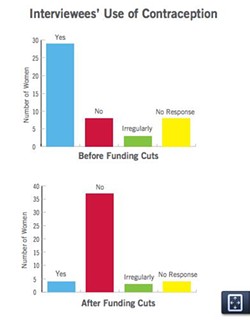Panelists with Nuestro Texas address the worsening health care crisis for women of the lower Rio Grande Valley during a campaign stop in San Antonio. Photo by Mary Tuma.
“I didn’t have it because we just couldn’t afford it. [
] No one wanted to help, not anywhere I went,” Mayda told interviewers. “My husband was out of work, we had nothing, we had no help, no money for a mammogram, so I just left it at that.”
“All this week and last we didn’t have an egg to eat in the house. We had no food, no nothing. I borrowed $20 here and $20 there to buy groceries [
] Think about it, if we can’t afford to buy food, how on earth can we afford [fees at] a clinic?”
Almost five years later, Mayda, who has developed intense cervical pain, still has not received a mammogram.
Drastic cuts to family planning, made by the Texas Legislature in 2011 left affordable health care, like life-saving preventative exams, out of reach for hundreds of thousands of women, like Mayda. Conservative state leaders slashed two-thirds, or $76 million from the funding pool, in a move directly meant to punish abortion providers, despite the fact none of the clinics affected provided abortion (or were allowed to, per state and federal law). Statewide, the budget reductions affected 150,000 women and caused nearly 80 clinics to cease operation.
Now, a coalition of reproductive health care advocates is touring the state to bring stories like Mayda’s to light while building a passionate network of activists that’ll push to ensure funding levels are not just restored but expanded.
Members of the Center for Reproductive Rights and the National Latina Institute for Reproductive Health, made a stop at the Esperanza Peace and Justice Center in San Antonio Friday afternoon and presented gut-wrenching and intimate findings from their 2013 report, “Nuestro Texas: The Fight For Women’s Reproductive Health In the Rio Grande Valley.”
“This report and our conversations with Latinas in Texas make it clear that no doubt the dismantling the women’s health network has made an already untenable situation much, much worse,” said Jessica González-Rojas, executive director of the National Latina Institute for Reproductive Health. “And that the health of women and families hang in the balance.”
As soon as the budget cuts took place, 28 percent of state-funded family planning clinics (or nine out of 32 clinics) in the lower Valley were forced to shut down and others drastically reduced hours and diminished services. The cuts devastated the region, said advocates, completely stripping women from access to basic preventative care such as contraception, cancer screenings, pap smears, well-women exams and STD tests.
The report— a compilation of personal interviews and focus groups with 188 women—deems the reproductive health care situation in the RGV as a both a human rights “violation” and a human rights “crisis.”
“Preventive reproductive health care policy is not just good economic sense or good public health policy, it’s also a matter of fundamental human rights,” said panelist Katrina Anderson, human rights counsel with the Center for Reproductive Rights.
The area is home to some of the poorest and least insured residents in not just the state but also the nation—more than a third of RGV residents live below the federal poverty line. Thus, the largely Latina women of the Valley are disproportionately impacted— while 40 percent of Texas women lost access to affordable repro health care, 77 percent of Valley women lost access.
These women face heightened barriers to access, the reports finds, like transportation, lack of accessible clinics, immigration status and cost.
For instance, prior to the 2011 funding cuts, women could access annual gynecological exams at $10-25, but today the prices range from $60-200. Women of the Valley say they experience the same with contraception and as a result, either take it less frequently or forgo use completely due to expense. As speaker Lucy Félix, a Texas Latina advocacy network field coordinator with the National Latina Institute for Reproductive Health told the San Antonio crowd, women of the lower Valley confess to her they must choose between birth control, pap smears or bringing food home to their families.
After funding cuts, contraception use severely diminished among those interviewed. Courtesy of Nuestro Texas.
Women that can afford appointments report wait times from several months up to one year and for some, a denial of service altogether, said Anderson. The results can be dire—without access to timely appointments, some women reported being diagnosed with late-stage cancer because they weren’t able to secure a pap test in time.
Pointing to cervical cancer— a mostly preventable ailment and one that affects Texas Latinas at a rate 19 percent higher than the national average—Anderson said, “Texas policies are needlessly causing women in the Valley to suffer and die from a disease that is preventable.”
But through the pain and damage, the advocates are slowly galvanizing a grassroots network of activists to fight back.
Anderson tells the Current the roving campaign will use their momentum to host a lobby day as the next legislative session approaches and provide a policy ‘blueprint’ of recommendations to elected officials. In it, they’ll request legislators ensure the $100 million allocated to women’s health through primary care during the 2013 session does, in fact, reach the women who are most in need and call to expand family planning funds.
Just last week, the campaign testified on Capitol Hill during a Congressional briefing. Drawing from international human rights and regional human rights treaties, the Nuestro Texas team argued the deep slashes to basic preventative care are a fundamental human rights violation, an infringement on equality, health, life and autonomy to reproductive decision-making and tantamount to ill treatment. Campaigners hope that by employing a human rights framework— a somewhat unconventional method for addressing women's health issues—the case on behalf of the struggling women sees more complexity and brings in families, the community and policy makers to the table while also creating a wider opening for mobilization to elicit change.
The report omits abortion access— a network similarly desperate and weakened by legislative policy. As a result of Texas’ 2013 abortion law, partly enacted last September, an estimated 19 clinics have shuttered their doors. Last week, the lone abortion in the Rio Grande Valley shut down, effectively marking the end of abortion access in the border area. The closures mean not only a reduction in abortion care but in basic health care, for those clinics also delivering preventative services.
“The Valley could not afford to lose two more reproductive health clinics and what happened is a tragedy,” said Anderson.
As the threat of cancer looms, as contraception is forgone, as preventative care exams are pushed back week after week, women will not stand deterred by fear, said the group of reproductive rights advocates.
“Latinas are rising up, they’re raising their voices and they are finding ways to thrive under the most difficult of circumstances,” said González-Rojas.
Nuestro Texas share the struggles of women like Mayda and Pilar (featured below) to highlight the devastating impact family planning cuts have had on the impoverished lower Rio Grande Valley:



















